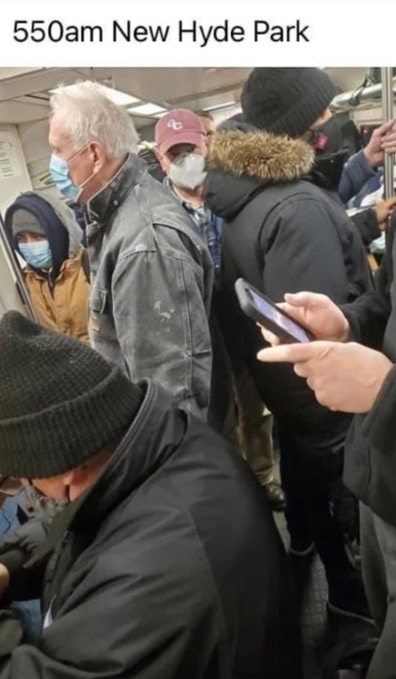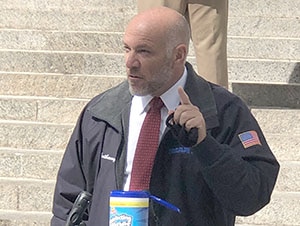President Joe Biden today signed his $1.9 trillion American Rescue Plan intended to stabilize the nation’s economy as it continues the task of rebounding from the COVID-19 pandemic that has killed more than 525,000 people in the United States.
The plan has $30.5 billion in emergency funding reserved to assist transit in the country rebound after an immense drop in use as a result of the coronavirus outbreak nearly one year ago. That amount is $10.5 billion more than the $20 billion requested by Biden in his initial version of the bill that was unveiled before he took office.
Passenger transit services were hit hard by the virus with ridership declining 95% for some carriers. In the initial stages of the pandemic, only essential workers used public transportation as many people in a number of highly populated areas went into lockdown.
“Our bus and transit members have been on the front lines working to provide for their families and to continue to keep the country running in the year since the coronavirus emerged in the United States,” SMART Transportation Division National Legislative Director Gregory Hynes said after the bill’s signing. “The transit funding provided by this plan will provide security for them going forward.”
Amtrak, the nation’s largest passenger rail carrier, also experienced a massive decline in ridership as a result of COVID-19. The carrier is slated to get $1.7 billion to help restore service that had been reduced last autumn, resulting in furloughs of SMART-TD and other unionized workers.
The carrier already announced that it will resume full long-distance service as a result of receiving the funds from the relief plan.
“‘Amtrak Joe’ and Congress has delivered for us,” Hynes said. “The American Rescue Plan is a much-needed boost that will allow Amtrak to recall all of our furloughed members and restore long-distance service very soon.”
The plan passed along party lines in both the U.S. Senate and in the U.S. House except for Democratic Congressman Jared Goldman of Maine, who voted against it.
The American Rescue Plan provides direct payments of $1,400 to individuals making up to $75,000 annually, $350 billion in aid to state and local governments and $14 billion for vaccine distribution. The bill also provides $130 billion to elementary, middle and high schools to assist with safe reopening.
In addition to providing direct payments to individuals, the plan also expands jobless benefits through September and child tax credits to assist families who are continuing to struggle through the pandemic.
“Elections matter, and never more than the last election,” Hynes said. “It’s time to hold those who were elected to office to the promises they’ve made. This is evidence that that is happening.”
Author: bnagy

The SMART Transportation Division already has made public its full support of U.S. Rep. Tim Ryan if he decides to run for the U.S. Senate for his home state of Ohio in 2022.
He’s already proven himself to us by showing up to support Amtrak workers during demonstrations against furloughs last autumn. But he did it again just days ago on the House floor, rebuking politicians who would rather talk about children’s book publishers who choose to stop publishing their own books rather than doing their duty to have a serious discussion about the PRO Act and fighting for hard-working Americans.
Through 10 terms as a representative of Ohio’s 17th and 13th Districts representing the working cities of Akron and Youngstown and as a former presidential candidate, he’s had plenty to say about helping American workers. March 9’s speech was no different.
“If there’s one thing you can always count on from me, it’s giving a damn about America’s working families,” Ryan tweeted out with a link accompanying the video below.
We appreciate his passion. We applaud Rep. Ryan’s focus, drive and fire when it comes to the working class. We thank him, and, once again, we support him.
Long Island Rail Road (LIRR) implemented planned service cuts the morning of Monday, March 8, in spite of objections made weeks ago by union leadership and echoed by New York state senators just before the cuts went into effect.
The result?
“These reductions have now made Long Island Rail Road service unsafe as far as allowing for social distancing is concerned,” Simon said.
In response to LIRR leadership’s implementation of the cuts, which reduced weekday service to the equivalent of what the system offers on the weekend, more than 3,000 unionized workers from SMART, SMART-TD and six other labor unions submitted the following message via email on March 8:
“WE THE UNDERSIGNED; ARE LIRR WORKERS WHO ARE OUTRAGED BY THE DECISION TO REDUCE SERVICE FOR LIRR RIDERS AT A TIME WHEN OPENING THE ECONOMY, CONTINUED DISTANCING, INCENTIVIZING CUSTOMERS TO RETURN AND PRIORITIZING THE USE OF FEDERAL DOLLARS IS CRUCIAL TO A FULL AND SAFE RECOVERY. WE ARE DISGUSTED THAT THE IMPLEMENTATION OF THESE CUTS AND THE INSENSITIVITY TO OUR QUALITY OF LIFE FOR OUR FRONT-LINE CRAFTS HAS DESTROYED OUR MORALE AND TRUST IN THE AGENCY. WE DEMAND YOU LISTEN TO YOUR “HEROES” AND RESTORE SERVICE FOR THE BETTERMENT OF OUR SYSTEM.”
In addition to Simon, SMART-Mechanical Division General Chairperson John McCloskey and TD yardmaster General Chairperson Michael Miele signed the letter addressed to New York Metropolitan Transit Agency Chairman and CEO Patrick Foye and LIRR President Phillip Eng.
“The MTA’s desire to outsource our work, disregard our membership’s quality of life and forget about what we have delivered throughout a global pandemic is inexcusable,” the union leaders stated. “We certainly hope you can get on the right track in winning us back for the good of this great railroad that we have built and have always been proud to serve. Until then, we will continue to work hard for our customers with the understanding that there is a lack of good faith and insufficient appreciation toward our members from leadership.”
Other unions that signed on to the letter included the Brotherhood of Railroad Signalmen; Transportation Communications Union; International Association of Machinists & Aerospace Workers; National Conference of Firemen & Oilers, SEIU 32BJ; Brotherhood of Locomotive Engineers and Trainmen; and Independent Railway Supervisors Association.
Read the letter. (PDF)
SMART Transportation Division Alternate Vice President and General Chairperson Anthony Simon and eight New York state senators took the CEO and chairman of the New York Metropolitan Transit Agency to task for planned service reductions for the Long Island Rail Road (LIRR).
The carrier plans to reduce weekday service to the equivalent of a weekend schedule beginning March 8, a move described by state Sen. James Gaughran and seven colleagues as operating LIRR as a “skeleton service.”
“We urge you to reconsider this decision and withhold implementation of the planned service reduction,” the senators wrote in their letter, dated March 3. “These ridership cuts will negatively impact countless essential workers, like the workers of the MTA, who rely on public transportation to earn a living, support their families, and contribute to our economy.”
In his letter dated Feb. 24, Simon communicated to MTA Chairman and CEO Patrick Foye that this course of action also did not seem to be a sound strategy as a potential spring economic awakening for New York City appears to be approaching.
The service reductions were supposed to last only until particular projects were completed by LIRR but could now be extended past the May 23 date that LIRR had given, according to Simon.
Both Simon and the senators made special note that SMART-TD members have worked through the pandemic, risking infection by COVID-19 as they continued to serve on the front lines of public transport. Simon argued in his letter that federal funds provided by the Biden administration should be used to maintain service to LIRR riders to ensure they have substantial service and a safe environment.
“Our members have weathered the effects of this pandemic as the heroes you’ve gratefully declared them to be time and time again. They have delivered to the riding public through some of the most difficult times in the history of our railroad,” Simon wrote. “Now is the time for them to continue delivering by leaving the adjusted weekday schedule as is and not seek a limited savings opportunity by creating a disincentive for our customers to come back.”
Read the senators’ and Simon’s letters. (PDF)
A Local 1544 (Maywood, Calif.) member lost his life as a result of injuries while performing service early March 3.
He had been a member of our union since July 2013 and was a conductor for BNSF.
A member of the SMART-TD National Safety Team is assisting the National Transportation Safety Board, which has launched an investigation into the accident.
Brother Ellis is the first on-the-job casualty of 2021 for our union. Last year, four of our members died while in service. He is survived by his wife, Trinity, and children.
An online fundraiser has been established by fellow Local 1544 member Jimmey Diaz during this time of loss for Brother Ellis’ family.
“There are no words to describe how we are all feeling at this moment,” Diaz wrote on the GoFundMe page. “The smiles and laughter will forever be remembered my friend.”
The SMART Transportation Division offers its sincere condolences to Brother Ellis’ family, his Local 1544 brothers and sisters and all those who knew him.
If you are a union member who participates in certain Union Plus programs and have been affected by the severe storms in Texas, you may be eligible for financial assistance through the Union Plus Disaster Relief Grant program.
Union Plus Disaster Relief Grants of $500 are available to eligible participants of one of the following programs:
- Union Plus Credit Card Program
- Union Plus Mortgage Program
- Union Plus Personal Loan Program
- Union Plus Life Insurance
- Union Plus Accidental Death Insurance
- Union Plus Auto Insurance
- Union Plus Retiree Health Program
To qualify for a Union Plus Disaster Relief Grant:
- Your residence must be in a county qualifying for individual assistance money from FEMA. To check if your county has been designated as an area eligible for individual assistance, visit FEMA’s disaster declarations page.
- You must have had a Union Plus Credit Card for at least three months, Union Plus Personal Loan for at least six months, Union Plus Mortgage, Union Plus Retiree Health Insurance, Union Plus Life or Accidental Death Insurance or Union Plus Auto Insurance for at least 12 months with that account or policy in good standing (be up to date on payments).
If you participate in the Union Plus Credit Card Program and want to apply for a disaster relief grant, call 1-800-622-2580.
If you participate in any other of the designated programs and want to apply for a disaster relief grant, call 1-800-472-2005. The Union Plus Disaster Relief Fund has provided nearly $1 million in assistance to union members facing hardships following Hurricanes Michael and Florence, floods and other natural disasters. Head to the Union Plus Disaster Relief Fund page to learn more about the benefits and eligibility requirements.
Additional information about Texas disaster assistance is available here.
Washington, D.C. – Greg Regan and Shari Semelsberger were unanimously elected today as President and Secretary-Treasurer, respectively, of the Transportation Trades Department, AFL-CIO (TTD), by the organization’s Executive Committee. The SMART Transportation Division is a member of the TTD.
Regan started at TTD as a legislative representative in 2011, was elected secretary-treasurer in 2017, and subsequently re-elected to that role this past March. Semelsberger began her career with TTD in 1999, and for the past decade has served as the office administrator, overseeing much of TTD’s operations.
Their election, held virtually, follows the tragic and untimely death of former TTD President Larry Willis who, over a 20-year career, helped establish TTD’s policy leadership, and raised the bar for demanding and enforcing worker protections throughout our nation’s transportation system.
A memorial video was produced by TTD to honor Willis.
“Larry dedicated his life to the labor movement, working tirelessly to enhance the rights and livelihoods of those who build, operate, and maintain our transportation system. He helped shape many of the policies frontline workers benefit from today, including due process and labor protections that are now standard in federally funded infrastructure projects,” Regan said. “I am committed to carrying forward the work Larry started, and will fight to improve the lives of transportation workers. Along with our unions, I am eager to help steer transportation workers through the ongoing COVID-19 crisis, and look forward to working with the Biden administration to build back better once the pandemic is behind us.”
Transportation union leaders also unveiled the Larry Willis Leadership Award, which will be given annually to a public servant or community leader who demonstrates commitment, dedication, and advocacy on behalf of transportation workers.
“Millions of people have had their lives improved because of Larry’s work. We see it today in the legislation he helped shape, the policy makers he reached, the colleagues and staff he mentored and inspired, and the working people he dedicated his life to,” Semelsberger said. “The Larry Willis Leadership Award will ensure this legacy lives on by recognizing those who exemplify the work ethic, passion, and mission-driven focus that Larry brought to TTD every day.”
TTD’s Executive Committee also discussed their priorities — including federally mandated COVID-19 workplace protections, emergency transportation funding, and long-term infrastructure investment — with Secretary of Transportation Pete Buttigieg.
“We have an enormous opportunity in this critical moment to deliver for the American people,” said Secretary Buttigieg. “We need to build our economy back, better than ever, and the Department of Transportation will play a critical role in this by implementing President Biden’s infrastructure vision: revitalizing communities that have been left behind, tackling the climate crisis, and enabling American small businesses, workers and families to compete and win in the global economy. In all of this work, labor will be a key partner in our efforts to build a modern infrastructure that creates good union jobs.”


